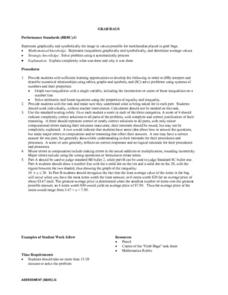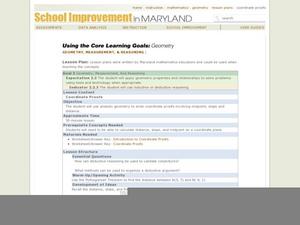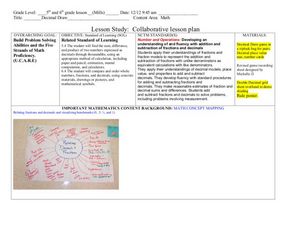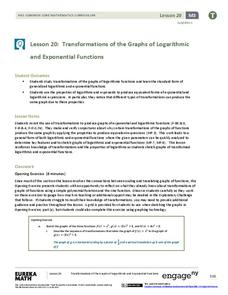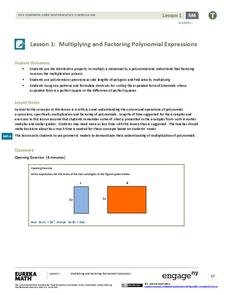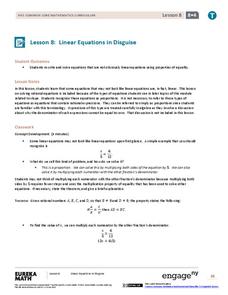Curated OER
Tunnel Traps
Pupils identify shapes that match specific shape descriptions involving a range of geometric terms and correct polygon names. They utilize a mathematics educational software program to gain practice.
Curated OER
Planet Picking
Students arrange the planets according to their distances from the sun. In this astronomy lesson plan, students list interesting properties about each planet. They identify an unknown planet photo.
Curated OER
Grab Bags
Eighth graders graph two inequalities with a single variable. They include drawing the intersection or union of inequalities on a number line. Students solve the linear equations using properties of equality and inequality. The lesson...
Curated OER
Coordinate Proofs
Students explore the concept of coordinate proofs. In this coordinate proofs instructional activity, students write coordinate proofs using properties of distance, slope, and midpoint. Students discuss why it is sometimes beneficial to...
Curated OER
Decimals: Collaborative Lesson
Learners explore mathematics by participating in a group activity. In this number value lesson, students identify the uses for decimals and how to best estimate whole numbers based on decimals and fractions. Learners collaborate with...
Curated OER
Computers Can Only Add
Young scholars explore using mathematics to solve problems in base two. After a teacher demonstration of using base two to write numbers. students model similar problems to explore the concept of number systems in different bases. To...
Curated OER
Company is Coming
Students find a recipe for pancakes on the web then figure out how to half the recipe then figure how to make 3/4 of the pancakes.
EngageNY
Transformations of the Graphs of Logarithmic and Exponential Functions
Transform your lesson on transformations. Scholars investigate transformations, with particular emphasis on translations and dilations of the graphs of logarithmic and exponential functions. As part of this investigation, they examine...
EngageNY
Fundamental Theorem of Similarity (FTS)
How do dilated line segments relate? Lead the class in an activity to determine the relationship between line segments and their dilated images. In the fourth section in a unit of 16, pupils discover the dilated line...
EngageNY
One-Step Equations—Multiplication and Division
Discover one more step to being able to solve any one-step equation. Scholars continue their work with one-step equations in the 28th installment of a 36-part module. Tape diagrams and algebraic processes introduce how to solve one-step...
EngageNY
Choosing a Model
There's a function for that! Scholars examine real-world situations to determine which type of function would best model the data in the 23rd installment of a 35-part module. It involves considering the nature of the data in addition to...
EngageNY
Linear and Nonlinear Expressions in x
Linear or not linear — that is the question. The lesson plan has class members translate descriptions into algebraic expressions. They take the written expressions and determine whether they are linear or nonlinear based upon the...
EngageNY
True and False Number Sentences
True or false? Scholars determine the truth value of equations and inequalities through substitution. All values to use for substitution are given with each equation or inequality. This is the 24th lesson in a module of 36.
EngageNY
Multiplying and Factoring Polynomial Expressions (part 1)
Polynomial multiplication and factoring go hand in hand. Why not teach them together. This resource begins with an area model for distributing a monomial and then connects the process to factoring the GCF. Learners then advance to...
EngageNY
The Zero Product Property
Zero in on your pupils' understanding of solving quadratic equations. Spend time developing the purpose of the zero product property so that young mathematicians understand why the equations should be set equal to zero and how that...
EngageNY
Modeling with Exponential Functions
These aren't models made of clay. Young mathematicians model given population data using exponential functions. They consider different models and choose the best one.
EngageNY
Solving Exponential Equations
Use the resource to teach methods for solving exponential equations. Scholars solve exponential equations using logarithms in the twenty-fifth installment of a 35-part module. Equations of the form ab^(ct) = d and f(x) = g(x) are...
EngageNY
Linear Equations in Disguise
In the eighth segment of a 33-part unit, learners look at equations that do not appear to be linear at first glance. The equations are proportions where the numerators and denominators may have more than one term. To round out the...
EngageNY
Solving Quadratic Equations by Completing the Square
Many learners find completing the square the preferred approach to solving quadratic equations. Class members combine their skills of using square roots to solve quadratics and completing the square. The resource incorporates a...
EngageNY
Solution Sets to Simultaneous Equations (part 2)
Do you want your budding mathematicians to be able to explain 'why' and not just 'do'? This lesson encourages an understanding of the process of elimination. Pupils are expected to understand how and why the elimination method is a valid...
EngageNY
Addition and Subtraction Formulas 2
Knowing the addition formulas allows for the calculations of double and half formulas. The fourth installment of 16 has the class use the addition formula to develop the double angle trigonometric formulas. Using the double formula,...
EngageNY
Comparing Linear Functions and Graphs
How can you compare linear functions? The seventh installment of a 12-part module teaches learners how to compare linear functions whose representations are given in different ways. They use real-world functions and interpret features in...
EngageNY
Complex Numbers as Vectors
Show your math class how to use vectors in adding complex numbers. Vectors represent complex numbers as opposed to points in the coordinate plane. The class uses the geometric representation to add and subtract complex numbers and...
EngageNY
The “WhatPower” Function
The Function That Shall Not Be Named? The eighth installment of a 35-part module uses a WhatPower function to introduce scholars to the concept of a logarithmic function without actually naming the function. Once pupils are...


